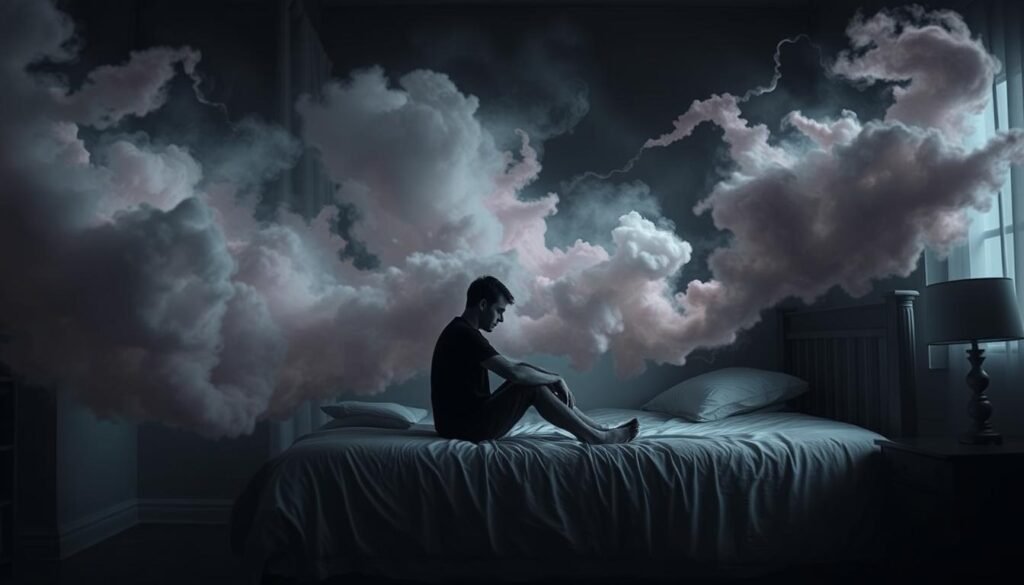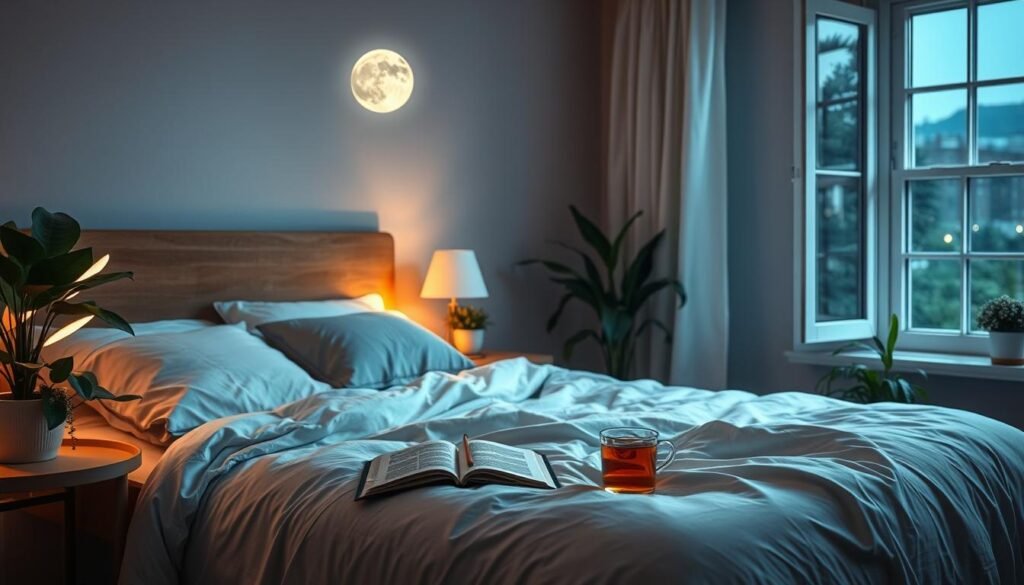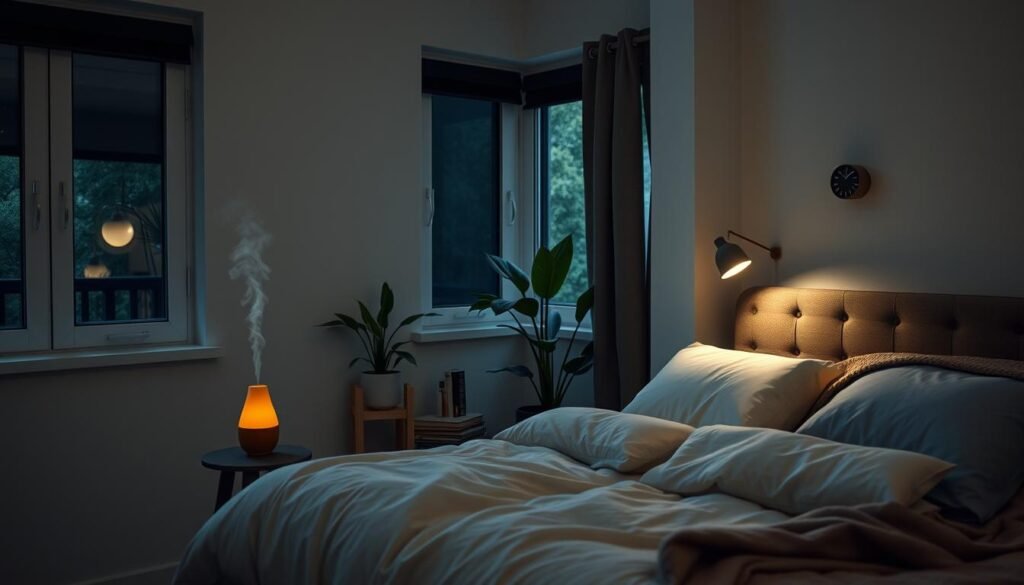Did you know almost half of Americans struggle with getting a good night’s sleep? This fact highlights the big problem of anxiety and insomnia that many face. The link between not sleeping well and feeling anxious is strong and hard to break. People with insomnia often find themselves in a tough cycle: anxiety keeps them awake, and not sleeping raises their anxiety.
We are going to look at ways to better handle anxiety and lack of sleep. This article offers a detailed plan to fight these issues, using methods that have been proven to work. Techniques like cognitive behavioral therapy, stress-busting exercises, and changes in daily habits can help. For more tips on beating sleepless nights, visit this site on stress relief techniques.
Key Takeaways
- The link between anxiety and insomnia can create a vicious cycle requiring focused strategies for resolution.
- Cognitive Behavioral Therapy (CBT) is often considered the most effective treatment for insomnia.
- Lifestyle changes, such as consistent sleep schedules and limiting stimulants, can significantly improve sleep quality.
- Pills for sleep are generally not recommended for long-term use and should be used cautiously.
- Integrating relaxation techniques like yoga and meditation can be beneficial in reducing symptoms of anxiety and insomnia.
Understanding Anxiety and Insomnia
Anxiety is when you feel really worried or uneasy a lot. About 20% of adults in the US have anxiety disorders. These can include Generalized Anxiety Disorder and Social Anxiety Disorder. They make everyday life and mental health hard.
What is Anxiety?
Anxiety includes different mental health issues that change how you feel and act. Around 43% of adults say anxiety affects their life a little bit. Generalized Anxiety Disorder hits about 3.1% of US adults. And about 9.1% have specific fears. Anxiety can really impact your work and personal life.
The Relationship Between Anxiety and Sleep
Anxiety and sleep problems are closely linked. Worrying too much can make it hard to sleep well. This can lead to sleep issues like chronic insomnia. Research finds that folks with anxiety and sleep troubles often can’t stay asleep. This makes them sleep less overall.
This lack of sleep can then make anxiety even worse. It’s a cycle that hurts mental health.
To learn how to handle anxiety and sleep better, look into these helpful tips.
The Vicious Cycle of Anxiety and Insomnia
Understanding how anxiety and insomnia are connected shows a worrying trend. Stress and sleep affect each other, leading to a harmful loop. Increased stress raises anxiety, which can ruin sleep. This makes it hard to deal with stress without enough sleep.
How Stress Affects Sleep
Stress has a big impact on sleep. Stressful events make it hard to fall asleep or stay asleep. About 30% of adults have insomnia symptoms, and less than 10% face chronic insomnia. Women and seniors are more at risk. Chronic insomnia often signals anxiety disorders.
Impact of Sleep Deprivation on Anxiety Levels
Lack of sleep makes anxiety worse. This forms a cycle that’s hard to break. Sleep-deprived people may feel irritable and worry a lot. This increase in anxiety can make it harder to handle stress. This can lead to more anxiety disorders. In those with PTSD, up to 90% have nightmares, making their mental health worse.

| Condition | Chronic Insomnia | Associated Risks | Prevalence |
|---|---|---|---|
| Anxiety Disorders | Higher risk | Increases chances for development | Common among adults |
| Depression | Associated risk | May worsen symptoms | Common among adults |
| PTSD | Excessive symptoms | Nightmares reported by 90% | Affected individuals |
| Irritability | Increased | Exacerbated by lack of sleep | Common in sleep-deprived individuals |
Identifying Your Sleep Disorders
It’s crucial to recognize sleep disorder signs for effective treatment. Symptoms of insomnia vary and can hurt your daily life and health. Spotting these signs is the first step to getting the right help.
Common Symptoms of Insomnia
Those with insomnia often have:
- Difficulty falling asleep
- Frequent awakenings during the night
- Waking up too early and unable to return to sleep
- Daytime fatigue or sleepiness
- Difficulty concentrating or mood disturbances
Insomnia’s symptoms could point to a sleep disorder or other health issues. So, talking to a health expert is key for a correct check-up.
Diagnostic Tools for Sleep Disorders
Health professionals use several tools to diagnose sleep disorders. These include:
- Comprehensive physical exams and discussions about medical history
- Sleep habit reviews, often recorded in a sleep diary
- Sleep studies to monitor sleep patterns and disturbances
A sleep study helps health experts see your sleep cycles. This can uncover problems. Insomnia affects your life greatly, making the right diagnosis and treatment plan critical.
Effective Cognitive Behavioral Therapy for Insomnia
Many people with insomnia find help through cognitive behavioral therapy (CBT). This method works on changing bad thought patterns that hurt sleep. About 30% of adults struggle with sleep, making CBT a top choice for insomnia. Studies show it’s good for fixing sleep and easing anxiety too.
Basics of Cognitive Behavioral Therapy (CBT)
CBT is all about knowing insomnia and using strategies to get better. It’s the main treatment for long-term insomnia, aiming to fix sleep with different techniques. Usually, it takes 6 to 8 sessions to learn and use these strategies.
CBT Techniques to Alleviate Anxiety and Improve Sleep
CBT offers key techniques that really help with sleep and cut down on anxiety. These techniques include:
- Stimulus Control Therapy: This makes your bedroom a place for sleep only, not for TV or work.
- Sleep Restriction: It sets a strict sleep schedule to boost how well you sleep.
- Relaxation Techniques: Things like muscle relaxation lessen anxiety and get you ready to sleep.
- Behavioral Modifications: Small lifestyle changes can greatly improve how you sleep.
Research highlights that using CBT methods lowers the time it takes to fall asleep and reduces mid-sleep awakenings. For example, people in studies saw their sleep time increase by 8 minutes on average. They also had a 10% rise in how efficiently they slept. This shows CBT helps with both sleep and mental health.

| CBT Technique | Benefits |
|---|---|
| Stimulus Control | Makes your bed a cue for sleep. |
| Sleep Restriction | Boosts sleep quality and encourages a stable routine. |
| Relaxation Techniques | Lowers anxiety and readies the body for sleep. |
| Behavioral Modifications | Better daily habits lead to improved sleep. |
CBT is not only about strategies; it’s also great because it avoids the side effects of medications. With help from trained therapists, you can really improve your sleep. This sets you on a path to a healthier life without anxiety.
Natural Remedies for Anxiety and Insomnia
Many people look for natural ways to ease anxiety and insomnia. They prefer not to rely just on medicines. Herbal supplements and relaxation methods are helpful and can fit into your daily life easily.
Herbal Supplements and Their Benefits
Herbal supplements are popular for their soothing properties. Here are some key ones:
- Chamomile: A daily 200-milligram dose of chamomile extract for 28 days can improve sleep in older adults. Also, taking between 220 to 1100 milligrams can reduce anxiety.
- Lemon Balm: Taking 300 milligrams twice daily for 15 days can help with sleep and anxiety. A higher dose of 1200 milligrams can ease stress before menstruation.
- Valerian Root: Taking 400 to 900 milligrams of valerian root extract before bed can help with sleep issues.
- Combination Products: Hops and valerian combined can help you fall asleep quicker than a placebo after 28 days.
Relaxation Techniques: Yoga and Meditation
Yoga and meditation can deeply impact your health. They reduce anxiety and help you sleep better. Yoga relaxes your body through movement and breath. Meditation brings mental peace and clarity.
Over 60 million Americans struggle with sleep. Natural remedies, yoga, and meditation can improve sleep. Using these methods can better your mind and body comfort.
Sleep Hygiene: Creating a Restful Environment
Good sleep hygiene is key for quality rest. It helps to go to bed and wake up at the same time every day. This keeps your body’s clock on track. Aim for 7 to 8 hours of sleep for the best health.
Setting the Right Sleep Schedule
Sticking to a regular sleep schedule can make you feel less tired during the day. It helps your body get ready for sleep naturally. Doing relaxing activities before bed, like reading, tells your brain it’s time to rest. Writing down worries can also make it easier to relax.
Modifying Your Sleep Space for Better Rest
Making your bedroom better for sleep is important. It should be dark, quiet, and cool, between 60 and 67°F (15.6 and 19.4°C). Keep out distractions, especially from screens, because they make it hard to sleep. Good sleep hygiene means making your room perfect for rest.

A good sleep environment keeps you healthy. Bad sleep habits can cause trouble sleeping and feeling tired during the day. Better sleep hygiene is an easy way to fix sleep problems. For more help creating a bedtime routine, check out this resource.
| Factor | Recommendations |
|---|---|
| Sleep Schedule | Go to bed and wake up at the same time every day. |
| Bedroom Temperature | Maintain between 60 and 67°F (15.6 and 19.4°C). |
| Lighting | Ensure the bedroom is dark; consider blackout curtains. |
| Noise Control | Reduce noise; use earplugs or a white noise machine. |
| Electronics | Avoid screens at least an hour before bed. |
Stress Management Techniques
Managing stress well is key to less anxiety and better sleep. A great way is through breathing exercises. These help our body relax, making it easier to handle stress. Adding these methods to our daily life can lead to calmer minds and improved sleep.
Breathing Exercises to Reduce Anxiety
Breathing exercises are an easy way to deal with stress. Deep breathing can calm both mind and body. You inhale deeply, hold for a bit, then exhale slowly. This clears the mind and eases tension. Doing this often makes it easier to manage stress.
Mindfulness Practices for Stress Relief
Mindfulness, like guided meditation, helps with stress. It makes us focus on now, not past or future worries. Adding mindfulness to our days can change how we feel. Just a few minutes daily can help us find peace. Check out mind and body approaches for tips on mindfulness.
Medication Options for Anxiety and Insomnia
Picking the right meds is key for dealing with anxiety and insomnia. For some, prescriptions are needed to get better. Talking to a doctor is critical to find out what works best for you.
When to Consider Prescription Medications
If changes in lifestyle and therapy don’t help enough, meds might be the next step. Insomnia and anxiety are big issues, affecting millions. Meds like Zolpidem (Ambien) and Eszopiclone (Lunesta) aid in sleep. But, drugs like Alprazolam (Xanax) or Diazepam (Valium) have risks, like addiction. Trazodone and Amitriptyline can help by improving mood and sleep.
Potential Side Effects of Sleep Aids
Prescription sleep aids can help a lot but they have downsides. Some common side effects are:
- Drowsiness
- Dizziness
- Confusion
- Dry mouth
- Changes in appetite
- Rebound insomnia
Drugs like Benzodiazepines can make you very sleepy or dependent. It’s vital to talk with a doctor about the good and bad of these meds. This ensures safe and smart use.
Improving Sleep Quality with Lifestyle Changes
Making lifestyle changes can greatly improve how well you sleep. It’s key to see how diet and sleep are linked. A healthy diet benefits your overall health and sleep. Adding exercise to your day improves sleep too. Despite our busy lives, taking steps toward a healthier lifestyle is beneficial.
Impact of Diet and Exercise on Sleep
The link between diet and sleep is proven. Certain foods help us sleep better, while some can make it hard. Avoiding big meals and sugary snacks before bed can help. Regular exercise, like running, also boosts sleep. It keeps us fit and lowers stress, which can cause insomnia.
- Consume balanced meals rich in whole grains, fruits, and vegetables.
- Avoid caffeine and nicotine in the hours leading up to sleep.
- Engage in daily physical activities, aiming for a minimum of 30 minutes.
Reducing Stimulants Before Bedtime
Cutting back on stimulants is crucial for good sleep. Many don’t realize caffeine’s effect if had in the afternoon. Even a little can disrupt sleep. Try herbal teas in the evening instead. This can help you unwind before sleep. Creating a relaxing environment also helps enhance sleep.
- Limit screen time before bed to reduce stimulation from blue light.
- Create a calming bedtime routine to prepare the mind for sleep.
- Maintain a consistent sleep schedule to regulate the body’s internal clock.
The Role of Support Systems in Healing
Support systems play a key role in beating anxiety and insomnia. They build emotional strength and help make meaningful connections. With professional help and community resources, people can see great improvements in their well-being.
Seeking Professional Help
Professional advice is key in treating anxiety and insomnia. Mental health experts provide custom strategies for each person. Seeing a therapist helps people learn how to cope and understand their conditions better.
Getting help early can reduce feelings of being alone. It shows how crucial mental health services are for recovery.
Finding Community Support and Resources
Community resources give extra support through local groups and health programs. These places allow people to share stories and encourage each other. Feeling you belong somewhere is vital for healing.
Meeting more people can lower the dangers of being alone. Studies show that being isolated can lead to worse health.
Conclusion
Understanding how anxiety and insomnia are connected is key to improving our health. Many studies show that not sleeping well can make us more likely to feel anxious. This means that by fixing our sleep problems, we might also reduce our risk of anxiety.
To live a healthier life, it’s important to work on sleeping better and feeling less anxious. During the pandemic, more than half of Americans had trouble sleeping. The American Academy of Sleep Medicine tells us to get at least 7 hours of good sleep for our health.
If you’re dealing with anxiety and sleep issues, knowing what help is available is important. Getting help from professionals, support from the community, and learning about how our bodies work can help us greatly. To learn more about these connections, check out this detailed article.